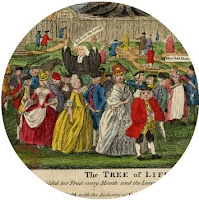On-line Resources
Randall Stephens
Art Remillard and I were talking on the phone today about working at teaching colleges/universities. Part of the responsibility/burden at such institutions, and people either love or hate this, is to teach courses that lie outside one’s bailiwick. So you focused on 19th century evangelical responses to cholera in London? Here’s a course on modern American diplomacy that you’ll need to cover. You wrote your first book on Jewish immigrants to Boston in the early-20th century? Could you offer this course on Medieval history? OK, maybe that’s an exaggeration. Regardless, I enjoy teaching the occasional course that pulls me outside of my field. Art seems to dig it as well.
you’ll need to cover. You wrote your first book on Jewish immigrants to Boston in the early-20th century? Could you offer this course on Medieval history? OK, maybe that’s an exaggeration. Regardless, I enjoy teaching the occasional course that pulls me outside of my field. Art seems to dig it as well.
I’ve had to be pretty resourceful . . . hunting down sources, trying to get some perspective on secondary literature, confessing to the students now and then that I know only a little more than they do about the topic.
I’m particularly interested in finding on-line materials for new courses I teach. And I enjoy pointing students to the wealth of images, digital archives, and primary sources that float out there on the “internets.”
Wendy Moore, a British trade author, just alerted me to the fabulous on-line collection of the British Museum. A quick search for "Methodists," "John Wesley," “Ranters,” “Quakers,” and "George Whitefield" returned dozens of items: satirical prints, scatological cartoons, bawdy broadsheets, etc. The images can be used for free for "private or non-commercial uses for education, academic study, scholarship or research by individuals or charities, societies, institutions or trusts existing exclusively for public benefit."
There are two other copyright free digital archives, which contain loads of religious prints, I use regularly for Historically Speaking: The Library of Congress, Prints and Photos Division and Yale's Beinecke Rare Book & MS Library.
As for primary source material . . . the list keeps growing longer and longer. Google books is just one of many recent resources I would have loved to have had back in my grad days. Searchable collections of historic newspapers, early American imprints, you name it. And to think that I nearly went blind going through 10,000 miles of microfilm.
Art Remillard and I were talking on the phone today about working at teaching colleges/universities. Part of the responsibility/burden at such institutions, and people either love or hate this, is to teach courses that lie outside one’s bailiwick. So you focused on 19th century evangelical responses to cholera in London? Here’s a course on modern American diplomacy that
 you’ll need to cover. You wrote your first book on Jewish immigrants to Boston in the early-20th century? Could you offer this course on Medieval history? OK, maybe that’s an exaggeration. Regardless, I enjoy teaching the occasional course that pulls me outside of my field. Art seems to dig it as well.
you’ll need to cover. You wrote your first book on Jewish immigrants to Boston in the early-20th century? Could you offer this course on Medieval history? OK, maybe that’s an exaggeration. Regardless, I enjoy teaching the occasional course that pulls me outside of my field. Art seems to dig it as well.I’ve had to be pretty resourceful . . . hunting down sources, trying to get some perspective on secondary literature, confessing to the students now and then that I know only a little more than they do about the topic.
I’m particularly interested in finding on-line materials for new courses I teach. And I enjoy pointing students to the wealth of images, digital archives, and primary sources that float out there on the “internets.”
Wendy Moore, a British trade author, just alerted me to the fabulous on-line collection of the British Museum. A quick search for "Methodists," "John Wesley," “Ranters,” “Quakers,” and "George Whitefield" returned dozens of items: satirical prints, scatological cartoons, bawdy broadsheets, etc. The images can be used for free for "private or non-commercial uses for education, academic study, scholarship or research by individuals or charities, societies, institutions or trusts existing exclusively for public benefit."
There are two other copyright free digital archives, which contain loads of religious prints, I use regularly for Historically Speaking: The Library of Congress, Prints and Photos Division and Yale's Beinecke Rare Book & MS Library.
As for primary source material . . . the list keeps growing longer and longer. Google books is just one of many recent resources I would have loved to have had back in my grad days. Searchable collections of historic newspapers, early American imprints, you name it. And to think that I nearly went blind going through 10,000 miles of microfilm.

Comments
Related to your "confession" point, I had a real hard time doing that at first. I suspect this is a hold-over from my Marine days (“Don’t show them your weakness”). But in truth, the post-confession atmosphere can take on a “we’re all in this together” feel--until the grading starts.